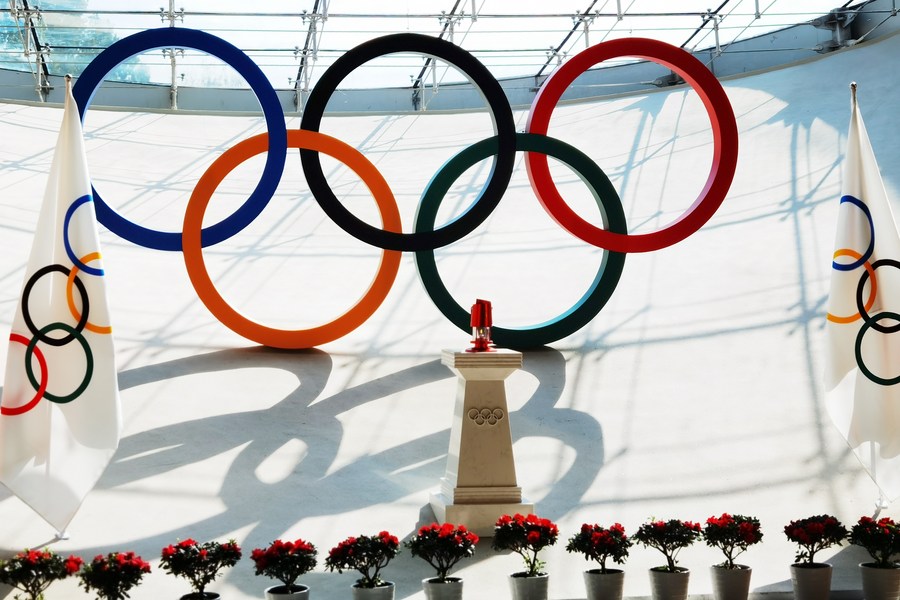Diplomatic boycott will not stop Beijing Winter Olympics from shining


President Xi Jinping and President Joe Biden did not discuss the Beijing Winter Olympics during their recent virtual call. Well, President Biden may be muttering, "It's only a couple of months away. Putin already received an invitation. Why am I left out? Actions must be taken, good or not, to let the world know that the United States of America is still here."
Shortly after the virtual call, the United States can't wait to make waves. According to the Washington Post and other US media, the White House is expected to announce that neither Biden nor any other US government officials will attend the Beijing Games. This diplomatic boycott is intended, the sources say, as a way to respond to the "Chinese government's human rights abuses" without impacting US athletes.
This comes as no surprise. The US has cast around desperately to boycott the Beijing Winter Olympics for a long time. Earlier, US congressmen and government officials turned up the heat on Olympic sponsors to withhold support for the Games. Unfortunately, their plan has fallen through, since the stakes are simply too high. How about not sending athletes to Beijing? This idea runs the risk of violating Olympic rules. History has made it abundantly clear that boycotting the Olympic Games as a result of major-power rivalry has deprived athletes of their once-in-a-lifetime opportunity to compete in the Olympic arena. The United States cannot afford to open this "Pandora's Box" again, as it doesn't want to put its own reputation on the line.
After weighing the pros and cons, the US may opt for a "diplomatic boycott" as a cost-effective way to embarrass China. Even if other countries do not follow suit, it is still enough to annoy China. Washington is betting on how much Beijing cares.
Politicizing sports has been an abnormal norm since the Cold War. Those with a hidden agenda admit that such tactics produce little real results, but are reluctant to give it up altogether. Given the state of play of China-US relations, nobody would expect China to invite US leaders to the Games. The so-called boycott is no more than a self-invented, and politically convenient, excuse for Washington.
US needs to take a lesson on Olympics rules
The international sports communities share the view that a boycott is "the most ominous specter of the Olympics". According to the Olympic Charter, the Olympic Games should not be politicized. The Charter clearly states that sports organizations within the Olympics Movement shall apply political neutrality and that sports and athletes should not be used for any political or commercial purposes. Any National Olympic Committee (NOC) in breach of the Charter by undercutting sports autonomy through political means shall be subject to disciplinary punishment by the International Olympic Committee (IOC) Session or Executive Board. Such breaches could lead to withdrawal of NOC rights, or withdrawal of full recognition at worst.
According to the Olympic protocol rules, US government officials who intend to attend the Games shall be invited by the United States Olympic & Paralympic Committee (USOPC). IOC has the final say. As the host country, China has not extended any invitation to US government officials. The "diplomatic boycott" seems illogical. There are two possible reasons to explain the US refusal to attend the Beijing Winter Olympics. Number one, USOPC didn't extend an invitation in the first place. Number two, the US government would rather decline USOPC's invitation than go to Beijing to cheer for American athletes.
China's great philosopher Confucius once said, "Isn't it a pleasure to have friends coming from afar?" Chinese people are hospitable. Those who come in good faith will definitely be warmly welcomed. For those who decline, we have no intention to compel them to do so.
But one thing is certain. China does not welcome those who disrespect the Olympic spirit and exploit the Olympics for a political agenda.
Political manipulation is in DNA of American politicians
When it comes to China, everyone knows what is on the US mind. The US has a reflex response of politicizing anything possible to contain China, from COVID-19 to the Olympics.
Back in 2008, when Beijing hosted the Summer Olympics, Nancy Pelosi, the current Speaker of the US House of Representatives, urged the Bush administration to boycott the Games. The excuse she chose was so-called human rights violations in Tibet. Thirteen years on, the lady doesn't even bother to make up a new lie, simply shifting Tibet to Xinjiang. The US is so addicted to old tricks.
Well, Americans are so proud of their human rights record.
Take a look at what is on their record. Genocide of native Americans, black slaves shedding blood and tears on the plantations in southern states, George Floyd crying, "I can't breathe." These are in broad daylight for everyone to see.
In 1936, racism was rife in the United States, even more rampant than it was in Nazi Germany. We would never forget the astounding story of Jesse Owens, an African-American track and field athlete who won four gold medals for the United States at the 1936 Berlin Olympic Games. When he returned to his homeland with honors, however, Owens was met with a cold shoulder. President Roosevelt refused to speak a word about him, let alone invite him to the White House. What happened next was even more heartbreaking -- he could not go to his own celebration party through the front door. "Negroes can only use the servers' entrance," the waiter insisted. We can watch this scene in the movie Race, a 2016 biographical film about Jesse Owens directed by Stephen Hopkins. "When I get back to America, I still have to get on the bus by the back door," Owens said with rage. "Hitler refused to shake my hand, but so did the President of the United States. I was hurt and insulted even more in America, in my own country."
Different views from USOPC
The US government reportedly said it would boycott the Beijing Winter Olympics without punishing the athletes, still allowing them to compete in Beijing. It may sound convincing, but is that really the case?
Ms. Sarah Hirshland, CEO of USOPC, said that any boycott of the Olympic Games has proven to have a negative impact on athletes' performance and morale. She stressed that any attempt to solve problems through a boycott would be futile. IOC made it clear that "the Olympic Games are managed by the IOC, not by governments or politicians".
The Beijing Winter Olympics is a grand gathering for winter sports athletes and fans around the world. Ms. Kate Caithness, President of the World Curling Federation, said recently, "I don't want to wait another 100 days. I hope the Beijing Winter Olympics will come soon." Such eagerness is shared by whole sports communities around the world.
For most athletes, their prime years do not last long. If the US government does care about the interests of their athletes, they had better stop indulging in the humdrum farce.


































